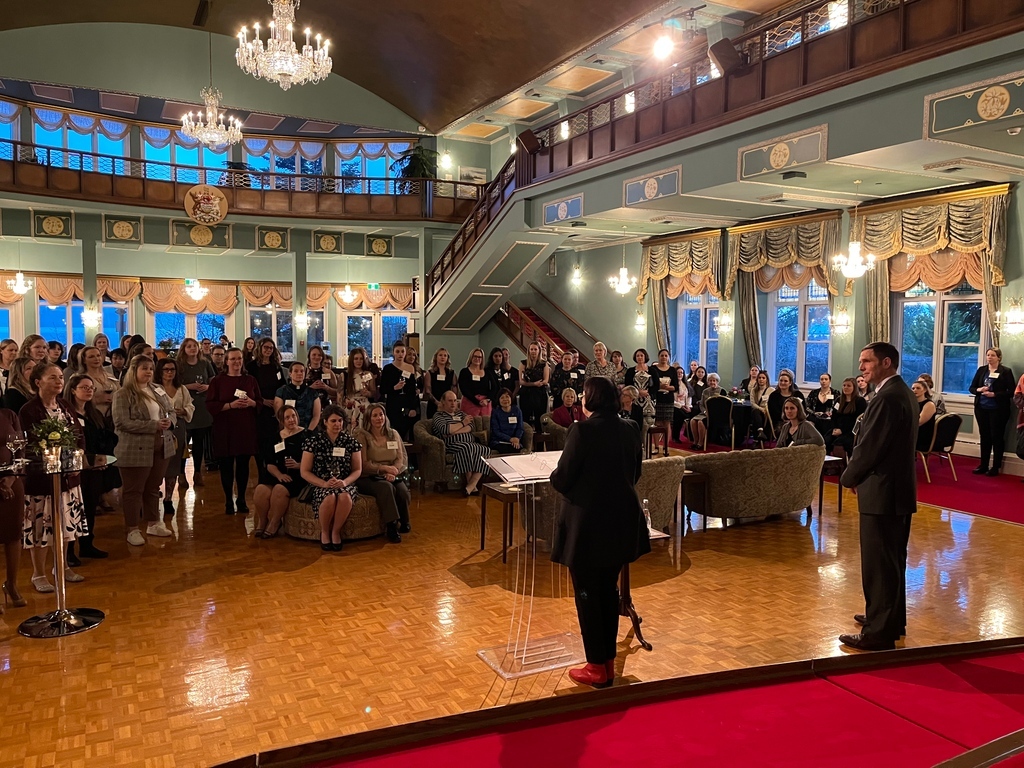More than one hundred women members from the Canadian Armed Forces (CAF) came together this month to learn, be inspired, and build connections at a Women in Uniform symposium, co-hosted by the Honourable Janet Austin, Lieutenant Governor of British Columbia, and Vice Admiral Angus Topshee, Commander of the Royal Canadian Navy.
The symposium kicked off at Government House, where participants gathered for a reception, and took the opportunity to relax and connect before two days of panels, keynote speakers, and open and earnest discussion about the experience of women in CAF.
The symposium offered opportunities for reflection on women’s achievements and the importance of improving gender equality and culture within the military. Top leaders from the CFB Esquimalt base were brought in to engage with participants about the challenges they experienced, and to hear their constructive ideas and advice on paths for resolution. Participants discussed the challenges they face in their everyday work through systems that are outdated, gaps in policy, and organizations that reinforce inequality. By recognizing low female representation in the service and barriers to retention, the symposium sought to make progress in a positive direction for existing and growing membership.
In the opening speech from Vice Admiral Topshee, he noted that just because things were always done a specific way, does not mean things cannot be questioned in ways that might lead to change. The Lieutenant Governor spoke on the “F word”— Feminist— describing it as a word “both benign and revolutionary”, and giving the advice to leaders, both present and future, that it’s okay for people to disagree with them, and to role model vulnerability.
Keynote speakers included BC’s Provincial Health Officer, Dr. Bonnie Henry, who spoke on how current systems are inherently sexist and racist because they are based on historic systems that privilege white males, and confer unearned disadvantage on women, BIPOC and gender diverse people. To change this, structural inequity must be acknowledged, and then the work of identifying how it plays out in day-to-day work can be done. This means daily acts of bravery, some big and some small, by those disadvantaged, supporting and lifting each other up, but also by those (mostly white men) in privileged leadership positions to recognize and call out injustices. During Dr. Henry’s time in CAF, she described often being the only woman and feeling “constantly under a microscope”, with her work carefully monitored to catch mistakes or to prove she didn’t know what she was doing. She recognized that this is still the case for many women or gender diverse people serving today, and being able to safely bring one’s whole self to work in the CAF makes it stronger and better for everyone.
Senator Rebecca Patterson spoke on the power of truth, on how telling truth can empower oneself, and build strong personal knowledge and trust. She challenged recipients to think about “firsts”, and how while they are something to celebrate, it’s also time to start looking for “who’s next”. Kindness and strength, she explained, are not diametrically opposed— they need to co-exist for success.
Participants also took part in two panels, with one covering “Shared Experiences and Tools to Confront Gender Bias” and the other on “Navigating Barriers and the Opportunity of Diversity”. A diverse array of panelists gave advice on not being afraid to smash the glass ceiling, and the importance of uplifting fellow women, overcoming imposter syndrome, and how to do one’s job while facing intense scrutiny and pressure.
The discussions and experiences of the symposium were both intense and uplifting, creating lasting relationships of support and camaraderie between participants, to be shared and continued from within and across ranks. Countless ideas were generated, with thanks to the leadership who spoke with vulnerability and candidness, and provided a safe and respectful space for everyone.
“I was incredible humbled by all the brilliant women who came and shared their personal experiences,” said Captain Patricia Laing, Chair of the Planning Committee for the Symposium, and Military Defence Women’s Advisory Organization MARPAC co-chair. “Events like this are essential to a diverse CAF. I am so pleased that we were able to bring together individuals of all ages, ranks and elements as a unified voice, building towards a fully inclusive CAF.”
It was appropriate that the symposium launched on International Women’s Day, and continued over the days of Women’s History Month, as participants left feeling inspired, and heard in ways they felt they had not previously, and, perhaps, ready to change history by forging their own new paths.


